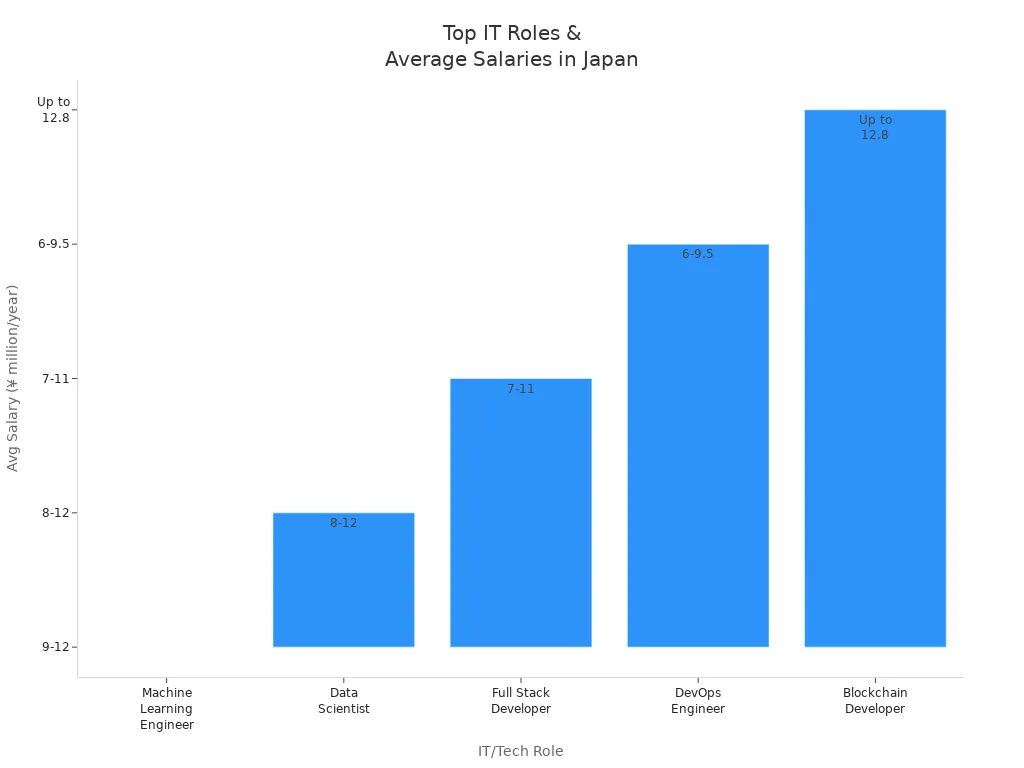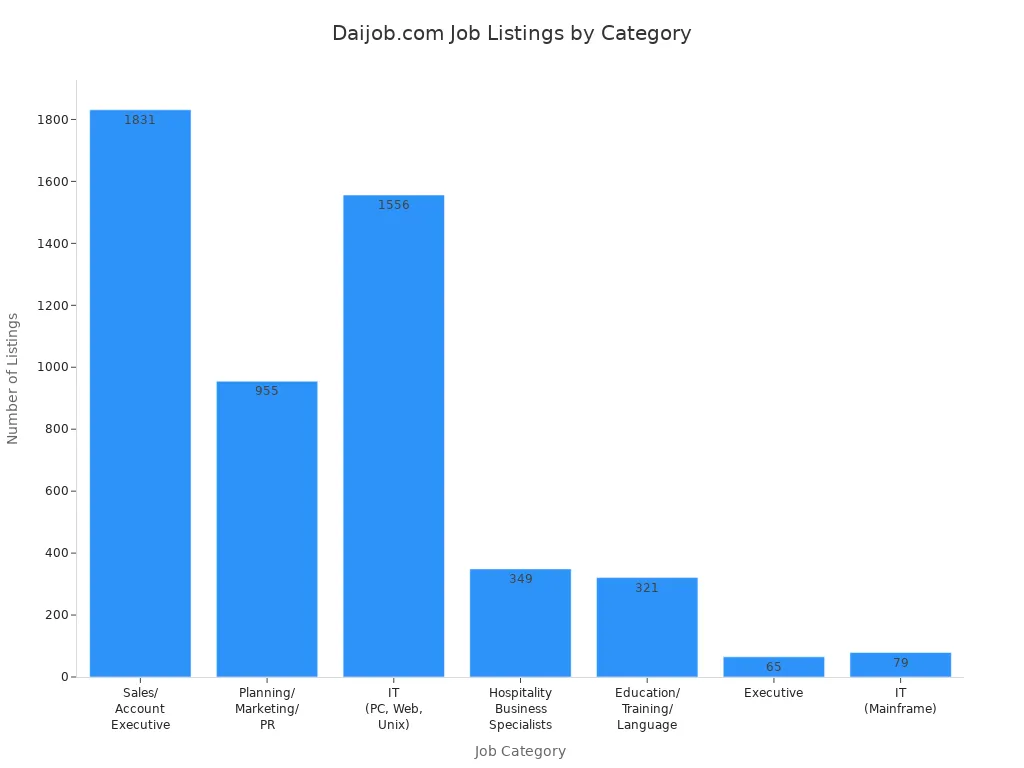- EasyCard
- Trade
- Help
- Announcement
- Academy
- SWIFT Code
- Iban Number
- Referral
- Customer Service
- Blog
- Creator
What Americans Need to Know About Working in Japan

Image Source: pexels
If you are an American who wants to work in japan, you need to know a few important things. You must have a job offer before you start working in japan. Most employers will sponsor your visa, which is a must for any american who plans to work in japan. Many jobs in japan welcome english speakers. You can find work as an english teacher, in IT, healthcare, or even business. Some companies want you to speak japanese, but you can still find work if you only speak english. You will notice that working in japan feels different from what you know. You will need to learn new ways to communicate and work with others. If you want to enjoy your time as an american working in japan, you will need to prepare for changes. You will find support and tips to help you succeed.
Key Takeaways
- Americans must have a job offer and visa sponsorship before working in Japan.
- Popular jobs include English teaching, IT, healthcare, finance, and tourism, many welcoming English speakers.
- Learning Japanese improves job options and helps with work culture, but some jobs require only English.
- Use job boards, recruiters, and networking to find jobs; networking helps find about 70% of positions.
- Prepare carefully for the move by understanding visa rules, Japanese work culture, housing, and living costs.
Job Types in Japan

Image Source: unsplash
Japan offers a wide range of job opportunities for Americans. Many jobs in Japan provide visa sponsorship, so you can find work in different fields even if you are new to the country. Here is a quick look at some of the most popular job types for Americans:
| Job Type | Description | Average Monthly Salary (USD) |
|---|---|---|
| English Teaching | High demand for teaching jobs in schools and language centers. | $1,700 - $5,000 |
| Translation | Work in translation and localization, often in gaming or business. | $3,800 |
| Information Technology | IT roles like system support, development, and management. | $5,400 (average) |
| Sales | Sales jobs in real estate, finance, and electronics. | $5,400 (average) |
| Engineering | Engineering jobs in construction, automobile, and electronics. | $5,400 (average) |
| Banking | Finance jobs in large companies, often for English speakers. | $6,100 (average) |
| Tourism | Work in travel companies and hotels serving foreign visitors. | $2,600 - $8,500 |
English Teaching
Teaching jobs are the most common job opportunities for Americans in Japan. You will find a strong demand for teaching English because millions of Japanese people want to learn the language. In Tokyo alone, about 1,000 language schools hire up to 15,000 foreign teachers. Programs like JET help you get started, and the esl industry stays strong because English is a required subject in schools. If you want to teach, you can find english language jobs in both public and private schools. Teaching English gives you a chance to meet new people and learn about Japanese culture.
- Over 16 million people in Japan are learning English.
- Many adults take English classes every year.
- Japan remains a top choice for teaching jobs because of steady demand.
IT and Tech
If you are an american tech professional, you will see many job opportunities in Japan’s IT sector. Companies look for skills in software development, data science, and cybersecurity. The average salary for IT jobs in Japan is about $5,400 per month. You can work for big names like Sony, Toyota, or Rakuten. The tech field values English-speaking job opportunities, especially when you help connect Japanese teams with global partners.

Healthcare and Nursing
Healthcare jobs in Japan are growing. Hospitals and clinics need nurses, doctors, and therapists who can speak English. If you have the right certifications, you can find work in international hospitals or clinics that serve foreigners. Some jobs in Japan in this field may require Japanese language skills, but there are options for English speakers too.
Finance and Business
Finance and business jobs in Japan offer high salaries and good job opportunities. You can work in banking, accounting, or sales. Many companies want employees who can speak English and help with international clients. If you have experience in finance, you will find jobs in Japan’s large cities.
Tourism and Hospitality
Tourism is a big part of Japan’s economy. Hotels, travel agencies, and tour companies need workers who can speak English. You can find work helping foreign visitors, planning tours, or working in hotels. The number of job opportunities in tourism goes up when more tourists visit Japan.
Other Sectors
You can also find jobs in Japan in fields like engineering, translation, and sales. Engineering jobs are open to foreigners, especially in construction and electronics. Translation jobs are available if you know both English and Japanese. Sales jobs often target foreign customers or expats.
Tip: Many jobs in Japan offer visa sponsorship, so you can start your career even if you are not fluent in Japanese.
Requirements for Working in Japan
If you want to work in Japan, you need to meet some important requirements. These rules help you get a job, stay legal, and enjoy your new life. Let’s break down what you need to know about work visa sponsorship, language skills, and education or certifications.
Work Visa Sponsorship
You cannot just move to Japan and start working. You need a job offer first. Your future employer must provide job sponsorship. This means the company will help you get a work permit and handle the paperwork for your visa. Without sponsorship, you cannot get a legal job in Japan.
Here are the most common types of visas for Americans who want to work in Japan:
- Work visa: For most jobs, you need this visa. Your employer must sponsor you.
- Highly skilled professional visa: If you have special skills or high-level experience, you can apply for this visa. It lasts up to five years.
- Specified visa: This is for special activities, like research or study programs. You need extra paperwork.
- Start-up visa: If you want to start a business in Japan, this visa helps you get started. You may get access to grants and subsidies.
- Intra-company transferee visa: If your company has an office in Japan, you can transfer there with this visa.
To get any of these visas, you must first get a Certificate of Eligibility (CoE) from Japan’s Ministry of Justice. Your employer will help you with this step. After you get the CoE, you can apply for your work permit at a Japanese embassy or consulate. You will need to submit documents like your passport, job contract, and proof of qualifications.
Note: Approval rates for these visas are not published, but having a strong job offer and complete documents will help your chances.
Language Skills
You might wonder if you need to speak Japanese to work in Japan. The answer depends on your job. Some jobs in Japan, like English teaching or certain IT roles, do not require you to speak Japanese. Many companies want English speakers, especially if you work with international clients.
However, knowing Japanese will open more doors. Many jobs in Japan have language requirements. Employers often look at your Japanese Language Proficiency Test (JLPT) level. Here is a quick guide:
| JLPT Level | Japanese Needed | Typical Jobs | Notes |
|---|---|---|---|
| N5 | Basic greetings | Entry-level internships | Not enough for most jobs |
| N4 | Simple conversations | Internships, part-time, basic communication jobs | Limited roles |
| N3 | Intermediate fluency | Hospitality, caregiving, manufacturing, translation support, customer service | Needed for many entry to mid-level jobs; required for Specified Skilled Worker visa |
| N2 | Business-level fluency | Engineering, IT, office jobs, management | Preferred for specialized and higher-paying jobs |
| N1 | Near-native fluency | Management, research, leadership, high-level translation | Needed for top professional positions |
If you want to work in Japan in fields like hospitality, caregiving, or customer service, you usually need at least JLPT N3. For jobs in engineering, IT, or management, companies often ask for N2 or N1. Even if you only speak English, you can still find jobs, but learning Japanese will help you fit in and move up.
Education and Certifications
Most jobs in Japan have education requirements. You usually need a college degree to get a work permit. This is true for teaching, IT, business, and many other fields. Some jobs in Japan, like English teaching, may accept any four-year degree. For other jobs, you may need a degree in a related field.
Professional certifications can also help you stand out. For example, if you want to work in healthcare, you need the right licenses and training. If you work in IT, having certificates like CompTIA or Cisco can boost your chances.
Sometimes, work experience can take the place of a degree. If you have many years of experience in your field, some employers may accept that instead of a diploma. Always check the job listing for specific requirements.
Tip: Bring copies of your diplomas, certificates, and reference letters. You may need to show these when you apply for your work permit or visa.
Meeting these requirements will help you start your journey to work in Japan. Make sure you have the right documents, skills, and job sponsorship before you make the move.
How to Get a Job in Japan
Looking for your next adventure? If you want to know how to get a job in Japan, you need to understand the best ways to search, connect, and apply. This section will guide you through the most effective steps for job hunting in Japan, from using job boards to nailing your interview.
Job Search Websites
You can start your job search by checking out popular job boards. These websites list thousands of jobs in Japan for English speakers and foreigners. Some of the top sites include GaijinPot, Daijob.com, Jobs in Japan, and TokyoDev. Each site has its own focus, but all of them help you find a job in Japan that matches your skills.
Here’s a look at the number of listings on Daijob.com, one of the biggest job search websites:
| Job Category | Number of Listings |
|---|---|
| Sales/Account Executive (AE) | 1,831 |
| Planning/Marketing/PR | 955 |
| IT (PC, Web, Unix) | 1,556 |
| Hospitality Business Specialists | 349 |
| Education/Training/Language | 321 |
| Executive | 65 |
| IT (Mainframe) | 79 |
| Other categories (combined) | Various (small numbers) |
Total active jobs on Daijob.com: 9,251 (as of 2025.07.29)

You can use filters to search by job type, location, or language requirement. If you want to work in IT, you will find over 1,500 listings. If you prefer sales or marketing, you have hundreds of options. These job boards make it easier to see what is available and help you start your job search with confidence.
Tip: Set up job alerts on these sites so you never miss a new posting.
Recruiters and Agencies
Recruiters and agencies can make your job search much smoother. They help you find jobs that fit your background and prepare you for the Japanese hiring process. Many recruiters will match you with companies, help you write a Japanese-style resume, and coach you for interviews. They also give advice about work visas and Japanese business culture.
You might feel overwhelmed if you try to apply for jobs in Japan on your own. Recruiters can save you time and frustration. On average, it takes about 17 weeks from starting your search to landing a job in Japan. Recruiters know what companies want and can help you avoid common mistakes.
Note: Recruiters do not charge you for their services. They get paid by the companies that hire you.
Networking
Networking is one of the most powerful ways to find a job in Japan. Many people get hired through connections instead of job boards. About 70% of jobs are found through networking. If you want to know how to get a job in Japan faster, start building relationships.
Here are some effective networking strategies:
- Meet people for coffee or online chats. Prepare a short introduction about yourself and your goals.
- Join professional groups or attend industry events. After-work social activities are common in Japan.
- Focus on exchanging information, not just asking for a job.
- Show genuine interest in others and be curious about their work.
- Keep in touch with your contacts. Sometimes, a second or third meeting leads to a referral.
- Learn some Japanese. Even basic skills help you connect with more people.
Networking is a long-term process. Stay persistent and open-minded. Many Americans find their first job in Japan through a friend or a friend of a friend.
Applying for Jobs in Japan
When you apply for jobs in Japan, you need to follow some important steps. The process is different from what you might know in the United States. Here’s how to get a job in Japan, step by step:
- Decide what kind of job you want. Think about your skills and Japanese language level. Teaching English is a good choice if you are just starting out. For other jobs, you may need business-level Japanese.
- Learn about Japanese work culture. Japanese companies value teamwork, politeness, and long hours. You will need to adapt to these customs.
- Write a Japanese-style resume. Use a clear format, include a professional photo, and tailor your resume to each job. Highlight your skills and experience that match the job description.
- Prepare for formal interviews. Dress professionally and show respect. Interviews are often online. Practice answering questions about your background and how you can help the company.
- Get your visa paperwork ready. Most employers will help you with this step, but you need to have your documents in order.
Common challenges include needing a four-year degree for most work visas, high Japanese language requirements for many jobs, and adjusting to a new work culture. If you want to apply for jobs in Japan, start early and stay organized.
Teaching English is often the easiest way for Americans to start working in Japan. Programs like JET offer support and help you adjust to life in Japan.
If you follow these steps and use the right resources, you will improve your chances of finding a job in Japan. Remember, job hunting in Japan takes time and patience, but the rewards are worth it.
Japanese Work Visa Process
If you want to work in Japan, you need to understand how japanese visas work. The process can feel confusing, but you can handle it step by step. Let’s break down what you need to know about visa types, how to apply, which documents you need, and tips for a smooth approval.
Visa Types
Japan offers several japanese visas for work. The most common is the standard Work Visa for Occupations. This covers jobs like teaching, IT, and business. You need a job offer and sponsorship from a Japanese employer. There are also Specified Skills Visas. Specified Skills Visa 1 asks you to pass skill and language tests for certain industries. Specified Skills Visa 2 is for higher-level jobs and lets you stay longer or bring family. If you want to travel and work for a short time, you can try the working holiday visa. This visa is popular with young people who want to explore Japan while working part-time.
Application Steps
You start by getting a job offer. Your employer in Japan will help you get a Certificate of Eligibility (CoE). This paper proves you meet the entry rules for japanese visas. After you get the CoE, you fill out the visa application and submit it to the Japanese embassy or consulate in the U.S. If you want a working holiday visa, you apply directly without needing sponsorship. Each step needs careful attention, so check every detail.
Required Documents
You must prepare several documents for your application:
- Certificate of Eligibility (CoE)
- Valid passport with at least one blank page
- Completed visa application form
- Recent passport-sized photo
- Job contract or letter from your Japanese employer
- Copies of your degrees or licenses
- Company information from your employer
If you apply for a working holiday visa, you also need proof of funds and a travel plan.
Tips for Approval
Many people worry about getting rejected for japanese visas. Here are some tips to help you succeed:
- Double-check all your documents for mistakes or missing info.
- Make sure your passport is valid and has enough blank pages.
- Show proof you can support yourself, like bank statements.
- Be honest about your background.
- Apply early to avoid delays.
- If you want a working holiday visa, explain your travel plans clearly.
Note: If you have questions, ask your employer or a visa expert. Careful planning makes the process much easier.
Japanese Work Culture

Image Source: pexels
Workplace Norms
When you start living and working in japan, you will notice that Japanese workplace norms feel different from what you know in the United States. Here are some things you should expect:
- People often socialize after work at group events called nomikai. These gatherings help you build close relationships with your coworkers.
- You will see a lot of bowing, especially when greeting clients or saying goodbye. People even bow until the elevator doors close.
- Business cards are important. You should exchange them with both hands and take a moment to look at the card before putting it away.
- Seating in meetings follows a strict order based on rank. This shows respect for hierarchy.
- Customers get treated with the highest respect. In service jobs, you may hear the phrase “the customer is god.”
Here is a quick comparison of Japanese and American workplace norms:
| Aspect | Japanese Workplace Norms | American Workplace Norms |
|---|---|---|
| Job Security | Long-term employment valued | Frequent job changes |
| Addressing Colleagues | Use last names with honorifics | Use first names |
| Teamwork | Group decisions, harmony important | Individual decisions, faster process |
| Communication Style | Indirect, avoid confrontation | Direct, open discussion |
| Socializing Norms | After-work gatherings expected | Informal, less after-work socializing |
| Business Etiquette | Bowing, formal card exchange, seating by rank | Handshakes, less formal |
Communication Styles
You will find that communication at work in Japan is often indirect. People try to keep harmony in the group. Here are some things to remember:
- People avoid saying “no” directly. They use gentle phrases to show disagreement.
- Silence is common in meetings. It gives everyone time to think.
- You may not always hear honest feedback. People hide their true feelings to keep the peace.
- Group loyalty matters more than individual opinions.
If you come from the United States, you might want to ask questions or share your ideas openly. In Japan, it is better to wait and watch how others act before you speak up.
Work-Life Balance
Work-life balance in Japan can be tough. Many companies expect you to arrive early and stay late, even if you do not get paid for extra hours. You may feel pressure to join after-work events. Promotions often depend on how long you have worked at the company, not just your skills. In the United States, you might find more flexible hours and remote work options. In Japan, you will need to adjust to a more demanding schedule.
Tip: Try to set clear boundaries and talk with your manager if you need time for yourself.
Living Costs
Living costs in Japan depend on where you live. In Tokyo, rent for a small apartment starts at about $700 to $900 per month. Utilities like electricity, gas, and water cost around $90 to $120 each month. If you choose to live outside the city center or in cities like Osaka, you can find cheaper options. Some foreigners choose shared housing to save money. Websites like Numbeo can help you compare prices for rent, groceries, and transportation between Japan and the United States.
Tips for Americans Working in Japan
Preparing for the Move
Getting ready to work in Japan takes planning. You want to make your move as smooth as possible. Here are some important steps to follow:
- Make a budget for your move. Include living costs, airfare, visa fees, and language classes.
- Connect with expat groups online. They can give you advice and support.
- Start learning Japanese. Even basic skills help you in daily life.
- Apply for the right visa. Your job type and skills decide which one you need.
- Get a Certificate of Eligibility from your Japanese sponsor.
- Show your commitment to living in Japan when you apply for jobs.
- Research housing options. Look out for things like key money and guarantors.
- Open a Japanese bank account to manage your money.
- Learn about health insurance in Japan and sign up.
- Know your tax duties in the U.S. while you live abroad.
- Study Japanese customs and business manners.
- Register your address at the local office within 14 days after you arrive.
Tip: Keep copies of all your important documents, both digital and paper.
Finding Housing
Finding a place to live in Japan can be tricky. Tokyo has high rent and many people. The average rent for a small apartment is about $965 USD per month. You may face language barriers since most landlords do not speak English. Some paperwork uses old methods like rubber stamps and fax machines. You might need a guarantor or pay extra fees called key money. If you feel lost, expat consulting services like Expat Empire can guide you through the process.
Expat Communities
You do not have to feel alone as an american in Japan. Large expat communities exist in Tokyo, Nagoya, Osaka, and Kobe. These groups offer social meetups, volunteer work, and information sharing. Platforms like InterNations host events and interest groups, helping you make friends and learn about life in Japan. You can find support in other cities too, such as Fukuoka, Kyoto, Okinawa, and Hokkaido.
Useful Resources
You have many resources to help you adjust to working in Japan. The U.S. Embassy in Tokyo offers help with legal issues and emergencies. The Japan-America Society of Washington DC provides cultural events, language classes, and networking. If you work in business, the U.S.-Japan Business Council gives you access to policy talks and business groups. Remember, foreigners in Japan cannot get welfare payments, so plan your finances carefully.
You can start your journey to work in Japan by finding the right job, getting visa sponsorship, and learning about Japanese work culture. Use the resources and tips in this guide to help you succeed. If you want support, try these ways to connect with others who have made the move:
- Join expat groups on Facebook or Internations
- Network with professionals on LinkedIn
- Talk with people already working in Japan
- Learn some Japanese before you go
You will find more help on job boards, expat forums, and through recruiters.
FAQ
What is the easiest job for Americans to get in Japan?
You will find English teaching jobs the easiest to get. Many schools hire Americans every year. You do not need advanced Japanese skills. Most programs help you with training and paperwork.
Do I need to speak Japanese to work in Japan?
You can find jobs that do not require Japanese, like teaching English or some IT roles. If you want more options or higher pay, learning Japanese helps a lot. Many companies prefer candidates with at least basic language skills.
How much money should I bring when moving to Japan?
You should bring enough to cover your first month’s rent, deposit, and daily expenses. Most people bring at least $3,000 to $5,000 USD. This helps you settle in before your first paycheck.
What documents do I need for a Japanese work visa?
You need these documents:
| Document | Purpose |
|---|---|
| Passport | Identification |
| Certificate of Eligibility (CoE) | Visa application |
| Job offer letter | Proof of employment |
| Recent photo | Application form |
Your employer will help with most paperwork.
As an American building a new life in Japan, managing your finances across borders can feel just as challenging as adapting to a new work culture. Traditional remittance methods often mean high fees, slow transfers, and limited exchange options. With BiyaPay, you get access to real-time exchange rate checks and instant conversions between multiple fiat and digital currencies. Transfers are completed with fees as low as 0.5%, while supporting transactions to and from most countries worldwide. That means whether you’re sending money home or managing your income abroad, you can keep more of what you earn. Start your journey with confidence — BiyaPay makes international money management simple, secure, and efficient.
Don’t let outdated systems hold you back. Register today with BiyaPay and experience smarter global transfers.
*This article is provided for general information purposes and does not constitute legal, tax or other professional advice from BiyaPay or its subsidiaries and its affiliates, and it is not intended as a substitute for obtaining advice from a financial advisor or any other professional.
We make no representations, warranties or warranties, express or implied, as to the accuracy, completeness or timeliness of the contents of this publication.




Contact Us
Company and Team
BiyaPay Products
Customer Services
is a broker-dealer registered with the U.S. Securities and Exchange Commission (SEC) (No.: 802-127417), member of the Financial Industry Regulatory Authority (FINRA) (CRD: 325027), member of the Securities Investor Protection Corporation (SIPC), and regulated by FINRA and SEC.
registered with the US Financial Crimes Enforcement Network (FinCEN), as a Money Services Business (MSB), registration number: 31000218637349, and regulated by FinCEN.
registered as Financial Service Provider (FSP number: FSP1007221) in New Zealand, and is a member of the Financial Dispute Resolution Scheme, a New Zealand independent dispute resolution service provider.




















